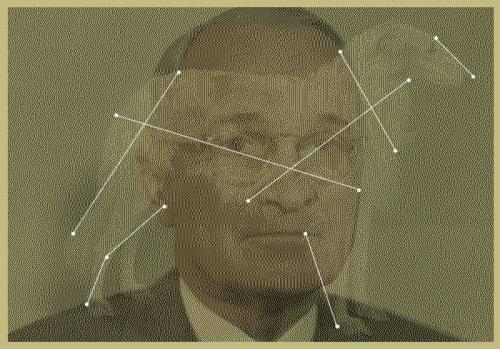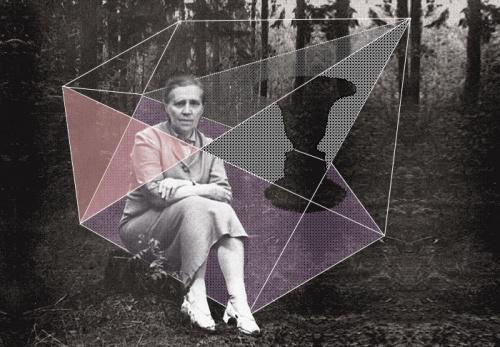898
Intellectual Dictionary
Gestalt, freak show, paradigm, and other mysterious words, which all have heard, but do not know znacheniya.V conversation intelligent people can often hear words like idiosyncrasy, freak show, Gestalt, and others. At the same time many people use these words in his speech at absolutely the wrong meaning, unaware of their true meaning.
"Theory and Practice" have decided to bring clarity and sensibly explained the meaning of abstruse terms and methods of their use.
What panoptikum
The word literally freak show stands from Greek as "a space where you can see everything." Now it is most often used in a figurative sense - so they say, when describing a bunch of freaks or as a synonym for the cabinet of curiosities. This value is derived from the common in the XIX century commercial panopticon. A famous example - Britannia Music Hall in Glasgow, formerly known as Britannia Panopticon. Its exposition famous freaks and wax figures, and found room in the basement menagerie.
Another tradition associated with the project panopticon perfect prison proposed by the English philosopher Jeremy Bentham in the late XVIII century. Bentham was obsessed with the idea of construction of the circular building, which is completely enclosed in view cameras would not see custody and did not know at what point they are being watched. Surveillance was conducted in a prison in the central tower would have to have the prisoners there is a feeling that they are under control at every moment. This system would allow to minimize the detention facility staff, ideally - to one person. For the philosopher, this was a vacancy dream - to be the overseer until old age, he offered himself.


Model panopticon was embodied in the Cuban prison Presidio Modelo, which now operates as a museum. Bentham's project was implemented there quite accurately, for example, the guard fell to the central tower four panopticon through underground tunnels that are in danger of rebellion mined. In this prison from 1953 to 1955 they were languishing in captivity Fidel and Raul Castro.
Michel Foucault's panopticon has seen in more than architectural plan. In his interpretation of Panopticon becomes disciplinary principle, far beyond the round shape of the building. He drew attention to the fact that the freak show was originally a model for many government agencies, and sees it as a technique of control over all forms of activities.
This interpretation of the panopticon enabled the followers of Foucault - the anti-globalization critics of Google and social networks - perceive a triumph of design Bentham in "surveillance society", set by modern control systems. First of all, it is shown in CCTV cameras and systems collect information about users. Typical headlines in this environment, "Electronic freak show" and "panopticon 1.0».
Incorrect
«Our Victor - a real freak show, he decided to Fermat's theorem in the second class." That's right - the only one. Em>
That's right:
« I hate peregovorki with glass walls - you feel not in the tank, not in the panopticon». Em>
What idiosinkraziya
You can often hear people talking about their idiosyncrasies and what anybody. Idiosyncrasy - term medical and psychological. Translated from the Greek as "someone very special temperament." And the body is individual intolerance of certain stimuli. Irritant - is any change in the internal or external environment, which may cause the cells and tissues in a state of excitation or inhibition.
In colloquial idiosyncrasy means acute intolerance of anyone or anything. "I can not stand", "How the devil in the grave poses", "at the thought of it spoiled the mood" - all forms of idiosyncrasy. Rejection dictated solely taste rather than physiology or psyche. There is some sense in that this phenomenon is a term borrowed idiosyncrasy, not an allergy. Idiosyncrasy, unlike allergies, has no rational roots and reasonable justification, it is always individual and occurs spontaneously.

Alexander Suvorov not stand mirrors. In homes where he stayed, their pre-shot or halts.
At Joseph Brodsky was idiosyncrasy of two things: he could not stand when they sing the poems (so that one guitar smashed head executor) and everything that is connected with France and the French.
Albert Einstein is credited with strange domestic idiosyncrasy: disliked socks and used every opportunity that they can not wear.
That's right:
«I idiosyncrasy of these zaznaek who constantly use the word paradigm and semiotics». em>
That's right:
«Time heals. Hate to have replaced Viktor Snjezana easy idiosyncrasy ». Em>
What geshtalt
"You just have to close the gestalt" - this advice we often hear from well-wishers and "experts" of all kinds. To understand what a Gestalt and proper use of this concept, it is necessary to turn to the psychology of perception.
The official date of birth of the term is considered to be 1890, when the philosopher Christian von Ehrenfels published his key work that we can not perceive the physical world itself. Man has always interacts with the information received from the senses - modifying it in his mind. Thus, for any integer we have more than the sum of its parts, because we invest in it and their perception.
This idea continued to grow during the 1910s-1930s, when psychologists began to actively explore the perception of art. Scientists have found that when we look at a painting or a statue, a major role is played by some holistic perception of the object can not be reduced to the sum of the properties of its constituent elements. Figuratively speaking, when we look at a painting by Renoir and other Impressionists, we do not notice and do not appreciate each stroke, and see a whole and that is the total combination of colors and shapes we are impressed. This holistic perception and became known as "Gestalt».
Similar experiments were performed with music - Ernst Mach in his "Analysis of Sensations" proved that the change of tone and tempo of music does not prevent the identification of the motif. A similar experiment - but only with the text - it is now widely replicated in social networks thanks to the ability to think gestalts you can understand the proposal, even if every word to change the order of letters and leave in place only the start and end.
Nparmier you lgkeo mzhotee pochrste this fazru.
From psychology, the term has migrated into psychotherapy and firmly settled there, creating a new direction- Gestalt therapy. Gestalt can be any process - passion for someone, quarrel or begun business.
Incomplete we remember better. For example, waiters in cafes remembers all outstanding orders and instantly forget performed. Because unfulfilled task to create a certain tension in the human memory.
This stress helps us not to forget about their needs, but in order that the person was mentally healthy, Gestalt should be promptly brought to its logical conclusion. Unfinished gestalt can cause obsessive desire to return to the situation and "replay" it. And the man begins to repeat previous schemes in the changed circumstances - for example, in a new relationship provokes conflicts unresolved with the same partner.
Wrong:
«This unexpected scientific theory destroys gestalt." That's right - "destroys patterns» em>
That's right:
«Cooking a child wanted to be a doctor, but it did not. Unfinished Gestalt forced her to send her son to medical school. » Em>
What paradigma
The word paradigm in speech has many meanings, most often used his sense of the term only dimly understand. The blogs can be found with the name of manifestos such as "Slavic paradigm" or "paradigm home studio." But if the value of this concept in kitchen conversations is extremely vague, the history of the penetration of a paradigm shift in our speech itself is quite definite.
50 years ago, in August 1962 saw the publication of one of the most important books of XX century - "Structure of Scientific Revolutions" by Thomas Kuhn. Analyzing the history of physics consistently, Kun was convinced that she did not develop progressively, by adding grains of knowledge in the general treasury of humanity as it is represented by Aristotle, as a revolutionary, from one stage to another closed. This stage in the history of science, he called paradigm (or normal science), and the transition from one stage to another - a paradigm shift (or scientific revolution). For example, Newtonian physics - a paradigm. Euclidean geometry - a paradigm.
But media paradigm in a broad sense - it is not only scientists, all people. Paradigm in this sense defines human approach to any phenomenon, its vision of the world and look at things. A famous anecdote about an optimist and a pessimist, seeing the empty or half full glass of water - just about the paradigm. In the primitive value of the paradigm - this is your way of seeing things.
Later, the word "paradigm" went far beyond the history of science and has been used widely in a broad sense outlook or way of thinking. While physicist pulled up philosophical base, business analysts and consultants has widely inspired customers that their business needs "paradigm shift».
Wrong:
«come to work in the middle of the day - the paradigm of the authorities." That's right - the prerogative. Em>
That's right:
«When we returned from Bali, from the liberal Viktor became a communist. New place, new paradigm. » Em>
What is semiotics
Semiotics - the science that studies signs and sign systems. This may explain, for example, why we watch porn. After the viewer watches pornographic film only image on the screen - iconic signs of human bodies and their movements. But these images are the same in shape with these bodies and therefore have the same signified, that is, cause in our minds and psyche of the same image. And the image, in turn, causes a physiological reaction.
The most obvious sign system - the language spoken by the people. In semiotics called natural, opposed to artificial sign systems, such as sign language, chemical symbols, mathematical languages and programming languages, Morse code, traffic signs, insignias of military uniforms and so on. Semiotics is not only describes such languages, but also participates in their development. It was invented an artificial universal language for people of different nationalities - Esperanto. As well as the language for interplanetary communications Lincos designed specifically for a space to communicate with intelligent beings beyond Earth.
Today is actively developing biosemiotics, which showed that, regardless of the question of the existence of the language of animals, their behavior based on instincts, functions like a sign system. This is indicated by the Soviet described symptomatology Zhinkin audio communication system in monkeys, as well as well-known of the "dance" of bees or the "language" of ants.
Wrong:
«Victor, I throw you. Your semiotic field makes me idiosyncrasy. " Correctly say - "semantic field» em>
That's right:
«I do not like classical opera for unnatural, it is semiotically overloaded.» em>
What postmodernizm
The term "postmodernism" is used generally to describe certain phenomena in culture. In art include whole areas: pop art, minimalism, conceptualism. In the literature, we do not even have to look for examples among Western writers as we are rich in their Viktor Yerofeyev, Sasha Sokolov, Vladimir Sorokin. Victor Pelevin wrote about the interpretation of the term as:
- What is it - post-modernism? - Stepan asked suspiciously.
- It is when you are doing the doll dolls. And he thus doll. Em>
Culture condition called post-modernism, characterized by the end of history, ideology, politics, the arts, social classes - the end of all time. Everything was, and today none of this works, we all broke and living in a kind of post-era, so it is perceived in the nineties. The author died personal style is not possible and not necessary, because the disposal of a variety of styles and forms of the past, which you can use and interpret. Neither the author nor the product does not claim to uniqueness and the more novelty. Perhaps the most significant feature of postmodernism is the lack of any position. The belief in the ideals inherent in the pre-war era, has evaporated. In the era of postmodernism most common position - a detached view of criticism, irony and parody of modernity and the past.
With the concept of "postmodern" theorists explain not only the cultural phenomena, but also social. Postmodernism involves some loss of faith in the collective interest in the history of the movement in progress.
At some point, postmodernism has become all-pervasive state, generating not only works of art but also a form of thought as such. People are getting tired of all peculiar ideals, and the language of the Internet, any ideals are merely a pretext for trolling. The consciousness of a large number of people is a product of post-modernism, as it is the series "The Simpsons" and "South Park».
Wrong:
«In my facebook postmodernism opinions inappropriate." That's right - pluralism. Em>
That's right:
«Basil, you have not made smarter if you call the postmodern mind their inability to read any book.» em>
See also:
The evolution of the brain
Illusion of color
How do you know that you *** nulis
via theoryandpractice.ru/
"Theory and Practice" have decided to bring clarity and sensibly explained the meaning of abstruse terms and methods of their use.
What panoptikum

The word literally freak show stands from Greek as "a space where you can see everything." Now it is most often used in a figurative sense - so they say, when describing a bunch of freaks or as a synonym for the cabinet of curiosities. This value is derived from the common in the XIX century commercial panopticon. A famous example - Britannia Music Hall in Glasgow, formerly known as Britannia Panopticon. Its exposition famous freaks and wax figures, and found room in the basement menagerie.
Another tradition associated with the project panopticon perfect prison proposed by the English philosopher Jeremy Bentham in the late XVIII century. Bentham was obsessed with the idea of construction of the circular building, which is completely enclosed in view cameras would not see custody and did not know at what point they are being watched. Surveillance was conducted in a prison in the central tower would have to have the prisoners there is a feeling that they are under control at every moment. This system would allow to minimize the detention facility staff, ideally - to one person. For the philosopher, this was a vacancy dream - to be the overseer until old age, he offered himself.


Model panopticon was embodied in the Cuban prison Presidio Modelo, which now operates as a museum. Bentham's project was implemented there quite accurately, for example, the guard fell to the central tower four panopticon through underground tunnels that are in danger of rebellion mined. In this prison from 1953 to 1955 they were languishing in captivity Fidel and Raul Castro.
Michel Foucault's panopticon has seen in more than architectural plan. In his interpretation of Panopticon becomes disciplinary principle, far beyond the round shape of the building. He drew attention to the fact that the freak show was originally a model for many government agencies, and sees it as a technique of control over all forms of activities.
This interpretation of the panopticon enabled the followers of Foucault - the anti-globalization critics of Google and social networks - perceive a triumph of design Bentham in "surveillance society", set by modern control systems. First of all, it is shown in CCTV cameras and systems collect information about users. Typical headlines in this environment, "Electronic freak show" and "panopticon 1.0».
Incorrect
«Our Victor - a real freak show, he decided to Fermat's theorem in the second class." That's right - the only one. Em>
That's right:
« I hate peregovorki with glass walls - you feel not in the tank, not in the panopticon». Em>
What idiosinkraziya

You can often hear people talking about their idiosyncrasies and what anybody. Idiosyncrasy - term medical and psychological. Translated from the Greek as "someone very special temperament." And the body is individual intolerance of certain stimuli. Irritant - is any change in the internal or external environment, which may cause the cells and tissues in a state of excitation or inhibition.
In colloquial idiosyncrasy means acute intolerance of anyone or anything. "I can not stand", "How the devil in the grave poses", "at the thought of it spoiled the mood" - all forms of idiosyncrasy. Rejection dictated solely taste rather than physiology or psyche. There is some sense in that this phenomenon is a term borrowed idiosyncrasy, not an allergy. Idiosyncrasy, unlike allergies, has no rational roots and reasonable justification, it is always individual and occurs spontaneously.

Alexander Suvorov not stand mirrors. In homes where he stayed, their pre-shot or halts.

At Joseph Brodsky was idiosyncrasy of two things: he could not stand when they sing the poems (so that one guitar smashed head executor) and everything that is connected with France and the French.

Albert Einstein is credited with strange domestic idiosyncrasy: disliked socks and used every opportunity that they can not wear.
That's right:
«I idiosyncrasy of these zaznaek who constantly use the word paradigm and semiotics». em>
That's right:
«Time heals. Hate to have replaced Viktor Snjezana easy idiosyncrasy ». Em>
What geshtalt

"You just have to close the gestalt" - this advice we often hear from well-wishers and "experts" of all kinds. To understand what a Gestalt and proper use of this concept, it is necessary to turn to the psychology of perception.
The official date of birth of the term is considered to be 1890, when the philosopher Christian von Ehrenfels published his key work that we can not perceive the physical world itself. Man has always interacts with the information received from the senses - modifying it in his mind. Thus, for any integer we have more than the sum of its parts, because we invest in it and their perception.
This idea continued to grow during the 1910s-1930s, when psychologists began to actively explore the perception of art. Scientists have found that when we look at a painting or a statue, a major role is played by some holistic perception of the object can not be reduced to the sum of the properties of its constituent elements. Figuratively speaking, when we look at a painting by Renoir and other Impressionists, we do not notice and do not appreciate each stroke, and see a whole and that is the total combination of colors and shapes we are impressed. This holistic perception and became known as "Gestalt».
Similar experiments were performed with music - Ernst Mach in his "Analysis of Sensations" proved that the change of tone and tempo of music does not prevent the identification of the motif. A similar experiment - but only with the text - it is now widely replicated in social networks thanks to the ability to think gestalts you can understand the proposal, even if every word to change the order of letters and leave in place only the start and end.
Nparmier you lgkeo mzhotee pochrste this fazru.
From psychology, the term has migrated into psychotherapy and firmly settled there, creating a new direction- Gestalt therapy. Gestalt can be any process - passion for someone, quarrel or begun business.
Incomplete we remember better. For example, waiters in cafes remembers all outstanding orders and instantly forget performed. Because unfulfilled task to create a certain tension in the human memory.
This stress helps us not to forget about their needs, but in order that the person was mentally healthy, Gestalt should be promptly brought to its logical conclusion. Unfinished gestalt can cause obsessive desire to return to the situation and "replay" it. And the man begins to repeat previous schemes in the changed circumstances - for example, in a new relationship provokes conflicts unresolved with the same partner.
Wrong:
«This unexpected scientific theory destroys gestalt." That's right - "destroys patterns» em>
That's right:
«Cooking a child wanted to be a doctor, but it did not. Unfinished Gestalt forced her to send her son to medical school. » Em>
What paradigma

The word paradigm in speech has many meanings, most often used his sense of the term only dimly understand. The blogs can be found with the name of manifestos such as "Slavic paradigm" or "paradigm home studio." But if the value of this concept in kitchen conversations is extremely vague, the history of the penetration of a paradigm shift in our speech itself is quite definite.
50 years ago, in August 1962 saw the publication of one of the most important books of XX century - "Structure of Scientific Revolutions" by Thomas Kuhn. Analyzing the history of physics consistently, Kun was convinced that she did not develop progressively, by adding grains of knowledge in the general treasury of humanity as it is represented by Aristotle, as a revolutionary, from one stage to another closed. This stage in the history of science, he called paradigm (or normal science), and the transition from one stage to another - a paradigm shift (or scientific revolution). For example, Newtonian physics - a paradigm. Euclidean geometry - a paradigm.
But media paradigm in a broad sense - it is not only scientists, all people. Paradigm in this sense defines human approach to any phenomenon, its vision of the world and look at things. A famous anecdote about an optimist and a pessimist, seeing the empty or half full glass of water - just about the paradigm. In the primitive value of the paradigm - this is your way of seeing things.
Later, the word "paradigm" went far beyond the history of science and has been used widely in a broad sense outlook or way of thinking. While physicist pulled up philosophical base, business analysts and consultants has widely inspired customers that their business needs "paradigm shift».
Wrong:
«come to work in the middle of the day - the paradigm of the authorities." That's right - the prerogative. Em>
That's right:
«When we returned from Bali, from the liberal Viktor became a communist. New place, new paradigm. » Em>
What is semiotics
Semiotics - the science that studies signs and sign systems. This may explain, for example, why we watch porn. After the viewer watches pornographic film only image on the screen - iconic signs of human bodies and their movements. But these images are the same in shape with these bodies and therefore have the same signified, that is, cause in our minds and psyche of the same image. And the image, in turn, causes a physiological reaction.
The most obvious sign system - the language spoken by the people. In semiotics called natural, opposed to artificial sign systems, such as sign language, chemical symbols, mathematical languages and programming languages, Morse code, traffic signs, insignias of military uniforms and so on. Semiotics is not only describes such languages, but also participates in their development. It was invented an artificial universal language for people of different nationalities - Esperanto. As well as the language for interplanetary communications Lincos designed specifically for a space to communicate with intelligent beings beyond Earth.
Today is actively developing biosemiotics, which showed that, regardless of the question of the existence of the language of animals, their behavior based on instincts, functions like a sign system. This is indicated by the Soviet described symptomatology Zhinkin audio communication system in monkeys, as well as well-known of the "dance" of bees or the "language" of ants.
Wrong:
«Victor, I throw you. Your semiotic field makes me idiosyncrasy. " Correctly say - "semantic field» em>
That's right:
«I do not like classical opera for unnatural, it is semiotically overloaded.» em>
What postmodernizm

The term "postmodernism" is used generally to describe certain phenomena in culture. In art include whole areas: pop art, minimalism, conceptualism. In the literature, we do not even have to look for examples among Western writers as we are rich in their Viktor Yerofeyev, Sasha Sokolov, Vladimir Sorokin. Victor Pelevin wrote about the interpretation of the term as:
- What is it - post-modernism? - Stepan asked suspiciously.
- It is when you are doing the doll dolls. And he thus doll. Em>
Culture condition called post-modernism, characterized by the end of history, ideology, politics, the arts, social classes - the end of all time. Everything was, and today none of this works, we all broke and living in a kind of post-era, so it is perceived in the nineties. The author died personal style is not possible and not necessary, because the disposal of a variety of styles and forms of the past, which you can use and interpret. Neither the author nor the product does not claim to uniqueness and the more novelty. Perhaps the most significant feature of postmodernism is the lack of any position. The belief in the ideals inherent in the pre-war era, has evaporated. In the era of postmodernism most common position - a detached view of criticism, irony and parody of modernity and the past.
With the concept of "postmodern" theorists explain not only the cultural phenomena, but also social. Postmodernism involves some loss of faith in the collective interest in the history of the movement in progress.
At some point, postmodernism has become all-pervasive state, generating not only works of art but also a form of thought as such. People are getting tired of all peculiar ideals, and the language of the Internet, any ideals are merely a pretext for trolling. The consciousness of a large number of people is a product of post-modernism, as it is the series "The Simpsons" and "South Park».
Wrong:
«In my facebook postmodernism opinions inappropriate." That's right - pluralism. Em>
That's right:
«Basil, you have not made smarter if you call the postmodern mind their inability to read any book.» em>
See also:
The evolution of the brain
Illusion of color
How do you know that you *** nulis
via theoryandpractice.ru/























